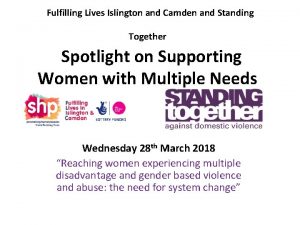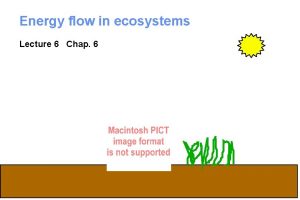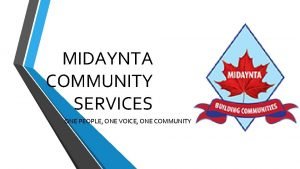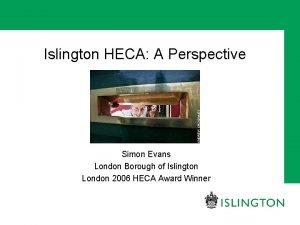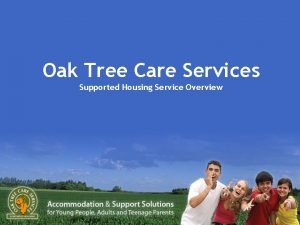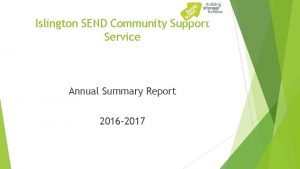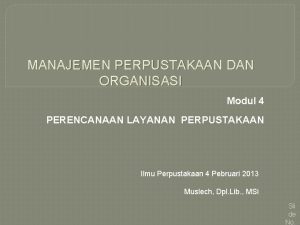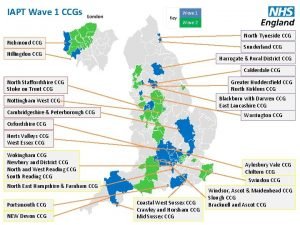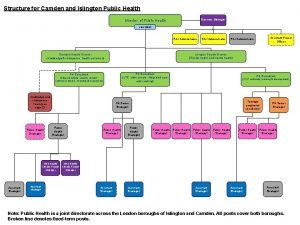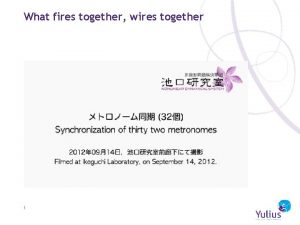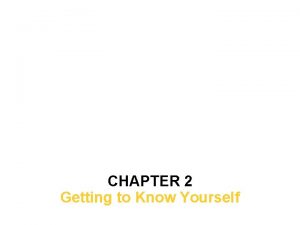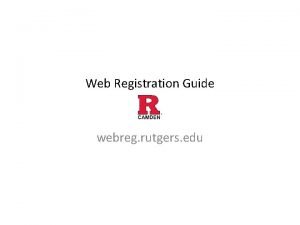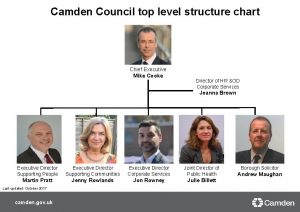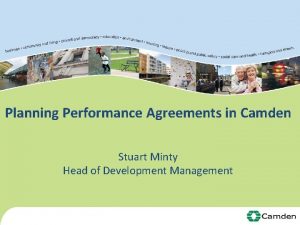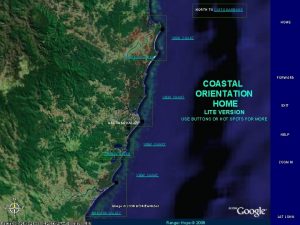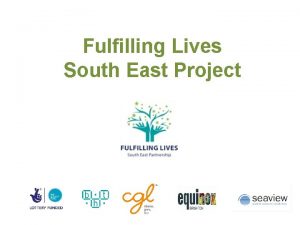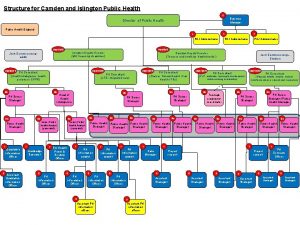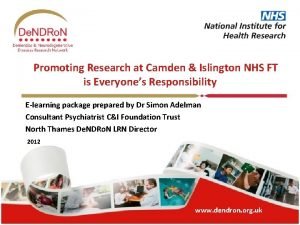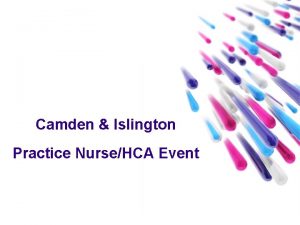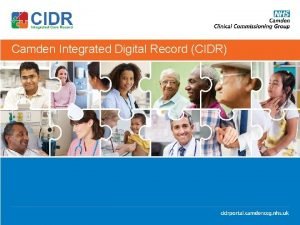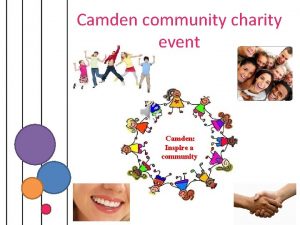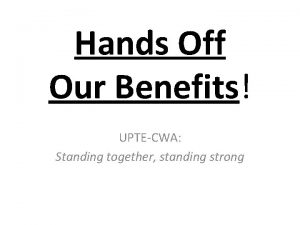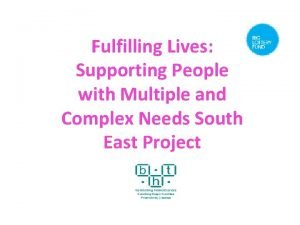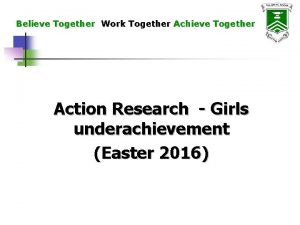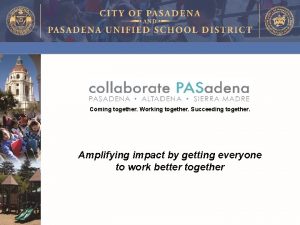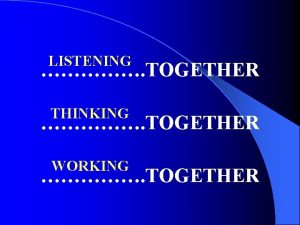Fulfilling Lives Islington and Camden and Standing Together

















- Slides: 17

Fulfilling Lives Islington and Camden and Standing Together Spotlight on Supporting Women with Multiple Needs Wednesday 28 th March 2018 “Reaching women experiencing multiple disadvantage and gender based violence and abuse: the need for system change”

Challenging exclusion, enabling change, building futures – Fulfilling Lives Islington and Camden (FLIC) works with people who have complex, unmet needs in all of the following four areas – homelessness, drug and alcohol use, mental ill health and offending behaviour. As well as providing intensive, flexible and creative support to link people in to the services they need and support them to navigate the pathways to their recovery, our project works to overcome exclusion and change systems so that they better meet the needs of this client group.

Driving the coordinated community response to domestic abuse – Standing Together

Who are these women? And what are the factors that complicate their lives? • Gendered violence and abuse - “The greatest disadvantage is experienced by those who endure a range of abuse across their life course – 80% are women” – Agenda, Hidden Hurt. • Multiple disadvantage – what does this look like for women? • Hidden homelessness - accessing services later than men – often greater complexity of need • Falling through the gaps between services, particularly homelessness and women’s specialist support services.

Why did FLIC focus on gender based violence and abuse? • FLIC have worked with 41 women 2014 – 2017. We are currently working with 32 women. • FLIC overall caseload 50% women (compared to 15% female rough sleeping population in Camden and Islington). • 100% of women on FLIC’s caseload had unmet needs in the areas of homelessness, substance use, mental health and offending at point of referral. • 87% of the women we work with have experienced gender based violence and abuse, either in the past or currently (disclosed to staff). • 20 women have been subject to Safeguarding Alerts and/or under MARAC due to domestic violence and abuse, sexual violence, or both, since beginning work with FLIC – many of them multiple times. • 1 woman has died in DVA related circumstances

What are FLIC’s key successes? • 95% of our clients who are experiencing gender based violence and abuse have engaged with their link workers for support with this issue – even if they remain with their perpetrators. • 84% of these women have been supported to move from homelessness or unsafe accommodation in to safer accommodation – including refuges, local authority temporary accommodation, PRS or supported accommodation. • Joint working and multi-agency approach to provide support and manage risk – overcoming barriers by working collaboratively alongside other services. • A holistic approach - long term case work has allowed us to build trust with the women we work with, address their needs according to their priorities rather than our agenda, focussing on health, well being and confidence. Wide range of service offer s– Housing First, Peer mentoring, personal budgets, etc – women can tailor their own support.

What are FLIC’s key challenges? • Supporting and engaging women who are rough sleeping or street active who are constantly with their perpetrators and live chaotic lifestyles. • Women not being able to engage with specialist DVA services - no mobile phones, to chaotic to attend appointments, distrust of services , multiple needs. • Clients being unable to access/sustain refuge accommodation due to their support needs and/or lack of complex needs refuges. • Clients being deemed not priority need at Housing Options, even when presenting with supporting evidence.

What happened next? A collaborative approach to system change • FLIC designated money for a demonstration pilot to try a new approach to supporting women experiencing gender based violence and multiple disadvantage. • FLIC alongside Solace Women’s Aid formed a multi-agency working group to plan a day long event in October 2016, the focus of which was “How we can better meet the needs of women experiencing multiple disadvantage and gender based violence? ” • The learning event was attended by around 50 managers, people with lived experience of related issues, commissioners, and front line workers from across the sectors of domestic violence, homelessness, substance misuse, mental health and offending.

How have these ideas been used to change systems? • • • FLIC’s evidence from the frontline work and event write up were used as part of the successful bid for DCLG funding for a supporting women’s engagement and recovery project which will cover Camden, Islington, Haringey and Enfield. SHP entered a successful consortium bid for this contract led by Solace Women’s Aid, also with Nia, AVA, IMECE, Hopscotch Women’s centre and Women at the Well. The Wi. SER project combines the expertise of women’s sector services, a homelessness/complex needs service, specialist women’s BME services – in order to reach more women and trial a different approach. The project has four full time Specialist Advocates (one in each borough), two part time BME specialist advocate navigators, a psychologist and resources for evaluation, training and capacity building across workforces in the four boroughs. The service will deliver a new integrated support service which will be flexible and responsive to the multiple needs of clients. The service will provide specialist, intensive assertive outreach support.

Demonstration pilot – Housing First for women experiencing DVA and multiple disadvantage • Funded by FLIC, delivered by Solace in Islington. • One specialist worker to provide independent housing and wrap around support for a small cohort of women (5 at any given time) who are not engaging well with services and are referred or repeatedly referred into MARAC/VAWG agencies with no positive outcomes around their housing, safety or engagement. • The clients will be experiencing domestic violence and abuse and multiple disadvantage. • The worker will support women to access independent accommodation and provide intensive, wrap around support to help them maintain this, as well as advocacy and navigation of crossagency support plans. • The worker will be able to work flexibly and creatively as per the Housing First guidelines in an outreach capacity, going out to women who are unable to engage with more structured, formal support.

Supporting women affected by domestic abuse and multiple disadvantage in the tri-borough: the partnership response Housing First and Homelessness Coordinator at Standing Together training, monitoring and evaluation, evidence and capacity building. The Green Room Night shelter for rough sleeping women at risk of violence, abuse and exploitation delivered by St Mungo’s. Outreach Advocacy, Multiple Support Project - pilot using ‘Housing First’ approach to support homeless women experiencing multiple disadvantage and domestic abuse, delivered by Advance.

The tri-borough project: What we want to achieve • Improve housing pathways for women experiencing violence, abuse and exploitation, and other forms of multiple disadvantage in the tri-borough. • Facilitate partnership working between women's specialist services and homelessness providers. • Embed awareness of domestic abuse and violence against women and girls (VAWG) into the homelessness sector. • Learn more about the needs and experiences of women affected by violence, abuse and multiple disadvantage.

Piloting Housing First with women experiencing domestic abuse in the tri-borough • Two specialist outreach advocates will support up to 20 women, piloting Housing First with this client group. • Delivered by Advance, a women’s specialist service provider. • Innovative partnership with housing providers. • Wrap around, holistic support with added focus on specialist risk management and safety planning around domestic abuse. • Physical safety as a pre-requisite for emotional safety – trauma and gender informed support.

Why are these new approaches so important? • We know that this cohort of women struggle to access specialist women’s support services. 154 women turned away from refuge services across the tri-borough. Women’s support needs too high/refuges under resourced. IDVA services are often short term phone support – cannot meet complexity of need of this group. • Homelessness services designed around the needs of male clients. A lack of women specific, gender informed support. • We are learning a lot about this group of women, and the wide range of gendered violence and abuse that they experience. Don’t always fit under definition of domestic abuse, but still in need of women specific, safe options.

Women tell us what works for them “I don’t want to have to talk to a lot of people. I am anxious at the best of times. But getting used to one person, who can help me with anything/everything that might be going on… that’s what I want. ” “I want someone who I can do nice things with, too, not someone who just talks about what has gone wrong, or drugs and other things… I think about those negative all the time anyway and I want a worker who I can feel positive with, happy. ” “I don’t want to be told what to do. I know what to do but it’s not that easy for me. Sometimes I just want someone to hear what I have to say, what I’ve been through”.

“I was always being asked to do forms. Do you know hard that is for me, it made me angry and anxious. I don’t want to go in to offices, I don’t want to do paperwork. I want someone who I can talk to and that’s what will really help me” “To talk to someone who has been through similar things, or maybe if they haven’t, knows someone that has… someone who doesn’t make you feel weird or different because of what you’re going through, someone who doesn’t get shocked. ” “And actually I have gone through a lot, I have survived abuse, the streets… what I want is someone to say, you are strong. ” “Just do it, even if they tell you to go away, you’ve got to help them. Even when people are angry – you really want someone who will stick with you, and still be kind”.

THANK YOU! Thank you all for listening! Special thanks to the organisations who have worked closely with FLIC and Standing Together to better support women affected by gender based violence and abuse, and multiple disadvantage: Solace Women’s Aid, AVA, LB Camden, LB Islington, St Mungo’s, MEAM, Standing Together, Women at the Well, LB Westminster, LB Hammersmith and Fulham, LB Kensington and Chelsea, Advance.
 Fulfilling lives in islington and camden
Fulfilling lives in islington and camden Difference between standing crop and standing state
Difference between standing crop and standing state Targeted youth support islington
Targeted youth support islington Midaynta community services
Midaynta community services Sap calculations lewisham
Sap calculations lewisham Islington virtual school
Islington virtual school Oak tree care services
Oak tree care services Sendias islington
Sendias islington Sistem browne adalah
Sistem browne adalah Isp islington
Isp islington Camden council structure chart
Camden council structure chart What fires together wires together
What fires together wires together Fulfilling obligations in a dependable and trustworthy way
Fulfilling obligations in a dependable and trustworthy way Webgreg
Webgreg Flights to camden nj
Flights to camden nj Chief executive camden council
Chief executive camden council Stuart minty
Stuart minty Camden haven bar cam
Camden haven bar cam
